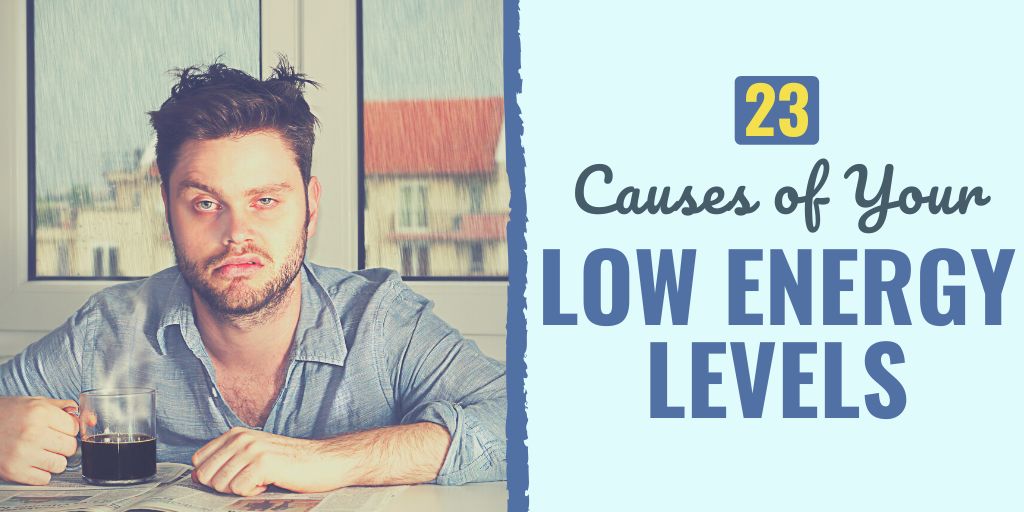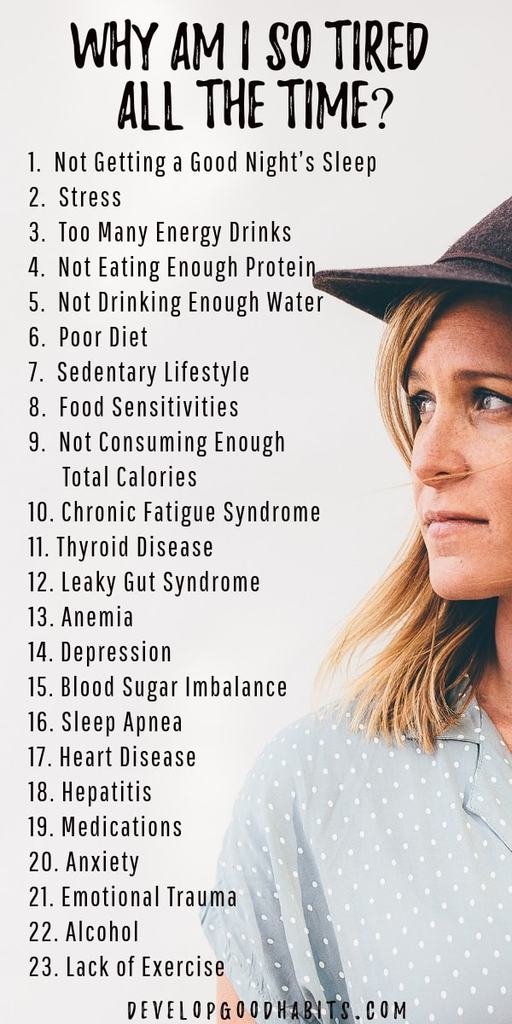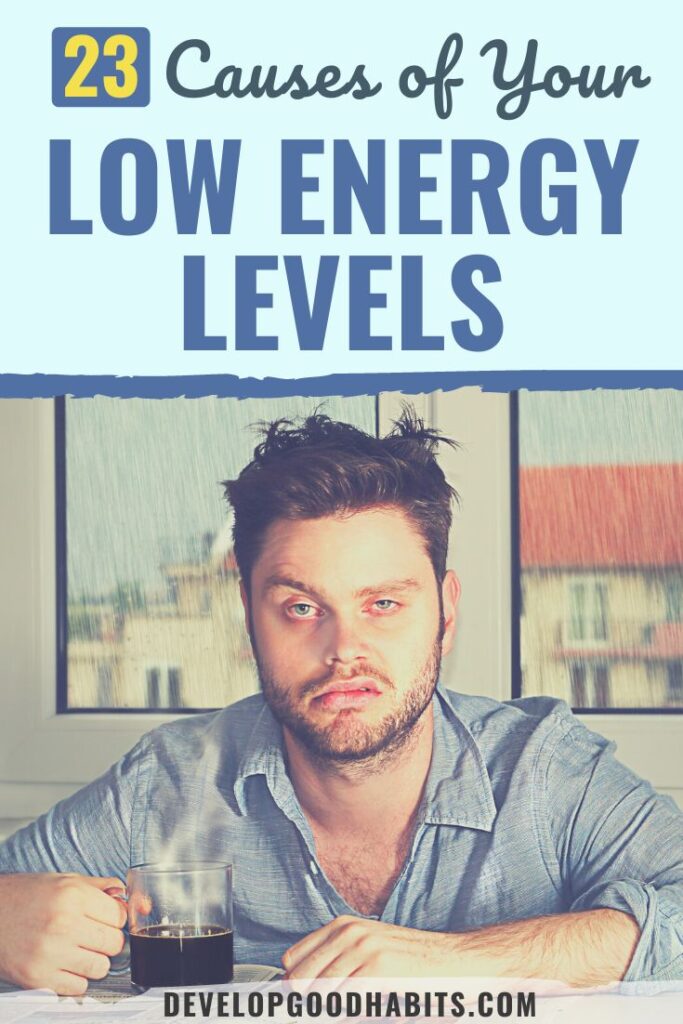Ever wonder why you are so tired all the time?
If so, you are not alone. Having low energy is a big concern for a lot of people. In fact, this common issue even has its own acronym—TATT—which stands for “tired all the time.”
This can be a huge barrier to success.
When it comes to creating a routine and building habits, it’s easy to make big plans for everything that you want to get accomplished.
If you're like me, you often have goals for each day, and you want to get a lot accomplished—but once you get going, you just want to lie back down and rest. What's worse, this even sometimes happens to me when I feel like I had a really good night's sleep the night before.
How can we accomplish anything if we are constantly experiencing low energy?
Constant fatigue can be a common sign of a variety of conditions and serious diseases that should not be ignored. If you feel like there might be a medical reason for your exhaustion, then it would be a good idea to consult with a doctor.
That said, low energy and fatigue can often be symptoms of a variety of bad habits and negative lifestyle factors that you can control. If this is the case, you can switch some of your unhealthy habits with healthier options, and increase the amount of energy you experience each day.
Side bar: I'd also recommend checking out The Energy Blueprint Masterclass, which has a six-step process you can use to get rid of your fatigue and increase your daily energy. With the simple actions you'll learn here, you can start each day feeling refreshed and ready to conquer any challenge!
In this post, we’ll talk about 23 potential causes of your low energy levels.
But first, let’s talk about a few signs that you might be feeling tired all the time.
Want a Quick Summary?!
Watch this video for a quick review of the common reasons why people experience low energy.
So sit back, press the play button, and enjoy the content! And for more actionable, habit-related videos, be sure to subscribe to our brand new YouTube Channel.
Signs That You Are Tired All the Time
Being tired all the time is a common complaint, even for people who try their best to get a good night's sleep.
If you are tired throughout the day, you probably find yourself hitting the snooze button in the morning, leading you to have a rushed start to the day because you can't get out of bed until the very last minute.
Your energy levels are directly linked to your mood and stress, so if you find that you are tired a lot, you probably often feel moody and more stressed out than you should be.
If you are constantly tired and you truly don't know the possible underlying cause, this is not normal, and you should consult your doctor.
How Lifestyle Impacts Your Energy Levels
Some unhealthy habits can certainly drain your energy. For example, what you put into your body has a large impact on how you feel throughout the day. If you drink too much alcohol, it can lead to depression and low levels of energy.
Likewise, if you eat a poor diet and don't fuel your body properly, it is not going to run at optimal levels. Along with eating a nutritious diet, you also have to exercise, or at least get up and get moving so you are not living a sedentary lifestyle.
Further, if your work hours are odd (like if you work at night), this can disrupt your sleeping patterns and lead to low levels of energy. Family can also disrupt your sleep, especially if you have small children who get up at various times of the night.
Changing some of these things may help improve your energy levels, but there may be different things causing you to feel tired. Let's look at some of the possible causes of low energy levels.
23 Causes of Your Low Energy Levels
1. Not Getting a Good Night’s Sleep
Do you ever find that it is quickly going on 9:00 pm and you still have a lot of things left on your to-do list?
Often, we have too much to do during the day, and run out of time to get it all done. I know this is something that I run into a lot.
It is easy to tell yourself that whatever you have to do is more important than getting into bed right away. Sometimes this can cause you to go to bed late, and also wake up early so you can finish some last-minute tasks before getting started on your day.
Not getting enough sleep or not sleeping through the night has physiological consequences on the body that are really harmful to your health.
To get the restorative sleep you need, it is important to not spend the day sitting and expending no energy. You have to have some physical activity to help your mind and body get the deep sleep that it needs.
Your sleep may also be disrupted if you nap during the day or do not follow a routine sleep schedule.
Napping or sleeping during the day can disrupt your body's natural circadian rhythm, which is the 24-hour cycle of your body's physiological processes that are modulated by sunlight. If your body doesn't know when to expect to have to go to sleep, it is unable to find a routine that it can count on.

2. Stress
If you are living with a lot of stress, your energy levels are likely going to be low.
While a lot of people live with a lot of stress in their lives, some know how to manage it effectively so it does not negatively impact their health. Some common things that may lead to stress even if you don't realize it are social media, your family, and your work.
3. Too Many Energy Drinks
Drinking too much caffeine, especially in the afternoon, can certainly interfere with your sleep. Energy drinks actually have more caffeine in them than a cup of coffee, and they are also full of sugar.
The high amount of vitamin B in energy drinks will give you a quick fix (that often leads to anxiety) if you feel your energy starting to drop, but it will lead to a subsequent plummet in energy later in the day.
4. Not Eating Enough Protein
If you are lacking high-quality protein in your diet, you may experience low levels of energy.
If you eat high-quality proteins that have branched-chain amino acids, you are more likely to be able to experience sustained energy throughout the day. Some foods that fit this bill include chicken, fish, eggs, lima beans, whole wheat, corn, and lentils.
5. Not Drinking Enough Water
Inadequate hydration can negatively affect your brain function. It is important to drink enough water to replace any water loss your body has due to urination, certain medications, spending time in the heat outdoors (or exercising), or drinking soda.
Dehydration also leads to an imbalance in your electrolytes that can further lead to energy depletion. Even if you are only slightly dehydrated, you can experience difficulty concentrating and low energy.

6. Poor Diet
Eating too many carbs or too much “junk” food can do the same thing to your body that energy drinks do—they give you a burst of energy, and are soon followed by a crash.
A poor diet may be the result of several things. If your lifestyle or daily habits cause you to eat meals out a lot instead of cooking at home, you are likely eating more junk food than your body is able to handle.
Making your diet a priority is important when it comes to overall health, including staying alert throughout the day.
Other influences—such as junk food that is sitting in your office, or being around friends who don't make their diet a priority—can also lead to poor nutrition.
Some people even consider themselves to be “carb-aholics,” and feel like they need to eat unhealthy carbohydrates often throughout the day. (If you want to improve your diet, then this superfood drink can help.)
7. Sedentary Lifestyle
Many of us have jobs that require us to sit for hours upon hours each day. In addition to sitting around and watching television or playing video games, this is a huge factor that leads to a sedentary lifestyle.
Even if people want to be more active during the day, there are many barriers that we face that prevent us from doing so.
Often, after a long work day, people want to just go home and relax, and not run out to the gym or go out and socialize. This limits the amount of outdoor activities that people participate in.
The problem with this is that our bodies were made to be used and moved throughout the day. The human body is not designed to sit all day, so when that happens, it often leads to more fatigue and low energy.

8. Food Sensitivities
It is possible that you have a food sensitivity and you are not even aware of it. Sometimes, food sensitivities lead to side effects such as fatigue or an overall feeling of poor health—but not enough to signal you to go to the doctor.
But food sensitivities can lower your energy levels and cause you to be tired throughout the day.
Some common foods that people are sensitive to include gluten, dairy, eggs, corn, and turkey. Because certain foods can make you feel tired, it is best to take a good look at your diet, and possibly do an elimination diet for a few weeks to see if it is impacting you.
9. Not Consuming Enough Total Calories
The calories in the food you eat turn into energy for you to use throughout the day. To stay energized, you have to eat enough to properly fuel your body. If you don't do this, your metabolism will slow down, which can lead to a decrease in energy, and weight gain.
It is also important to make sure that you are getting all of the proper vitamins and minerals your body needs to function at an optimal level. In order to do this, aim for 1,200 calories each day so you can be sure that your body is getting the nutrition that it needs.
10. Chronic Fatigue Syndrome/Adrenal Fatigue Syndrome
Many people—especially women in their 40s and 50s—experience hormonal imbalances that can lead to non-fading fatigue. Hormonal imbalances also have other symptoms, such as:
If you body has hormonal imbalances, many key hormones go up and down depending on the level of stress in your body. Because of this, high levels of stress and symptoms of adrenal fatigue are closely related.
11. Thyroid Disease
Low energy is a very common symptom of hypothyroidism, which is characterized by an underactive thyroid gland. This may occur because of a decrease in hormone production in the thyroid.
This could happen for many reasons, including stress, poor diet, eating a carb-heavy diet, not eating enough high-quality protein, goiter, or radiation and toxic exposure that leads to the release of hormones that impact the body.
It is important to get your thyroid checked if you are having signs of hypothyroidism, such as fatigue, moodiness, and weight gain. The good thing is that, once you are properly treated for hypothyroidism, you will likely experience a resolution of or improvement in your fatigue.
12. Leaky Gut Syndrome
Leaky gut (also known as “intestinal permeability”) is a condition where the lining of the small intestine becomes damaged and causes undigested food, bacteria, and toxic waste to seep through the lining of the intestines and enter the bloodstream.
Having a leaky gut can deplete your energy because it can prevent your body from absorbing the nutrients it needs to function. Some other symptoms of leaky gut syndrome are:
This is often caused by autoimmune diseases, but can also be caused by eating too many GMO foods.
13. Anemia
The most common symptoms of having low iron and a low red blood cell count are fatigue, exhaustion, feeling weak, and having low energy. If you have anemia, it may be difficult to come up with the energy that you need to do normal activities, even if you get a sufficient amount of sleep.
This is because your body is not supplying your cells and tissues with the oxygen that they need to properly function.
Certain types of anemia are caused by a poor diet that consists of low levels of vitamins or iron. Anemia can also be caused by certain diseases and medical conditions.
Treatment for anemia may include altering your diet or taking extra vitamin supplements—especially vitamin B12 and folate. To help the body absorb iron, vitamin C is also a good supplement to take.
To get more iron from your diet, it is best to eat meat. Red meat is best, but other good food sources of iron include liver, chicken, fish, turkey, and pork.

14. Depression
If you are experiencing depression, you are likely also suffering from low energy levels. You may even feel so tired that you can hardly come up with the energy to get out of bed in the morning.
In addition to having low energy, many people suffering from depression also have insomnia. On the other hand, some people who have depression feel as if they could sleep all day.
The high levels of stress due to unsolved emotional issues and not being exposed to enough sunlight lead to neurotransmitter imbalances that can disrupt the circadian rhythm as well.
Finally, people suffering from depression often eat diets that are high in processed foods and low in micronutrients, which also leads to a decrease in energy.
15. Blood Sugar Imbalance
There are two things that can be going on in your body that lead to a blood sugar imbalance.
The first is insulin resistance, which leads to chronically high blood sugar levels followed by high insulin levels to counteract the blood sugar.
The second is hypoglycemia, which is also characterized by high and low fluctuations in blood sugar. Both of these health issues lead to an improper function of mitochondria due to the lack of consistent blood sugar available for energy production.
Blood sugar imbalances can be caused by eating refined carbohydrates, which causes a spike in blood sugar levels. If you eat fewer refined carbs, you are likely to have more energy and fewer mood swings. You will also lower your chances of developing diabetes.
16. Sleep Apnea
Studies show that experiencing pauses in breathing while you sleep can lead to low energy. What's more, people who have undiagnosed sleep apnea don't necessarily feel sleepy—they just have a lack of energy.
This disruption in sleeping can also lead to morning headaches, memory problems, and difficulty concentrating. If left untreated, sleep apnea may lead to heart disease.
You may not be aware that you have sleep apnea, especially if you sleep alone. Often, someone notices that their partner is gasping for air throughout the night, or often snores while they are sleeping, leading them to get tested for sleep apnea. If you live alone and are experiencing these symptoms, mention it to your doctor so you can have a sleep test.
17. Heart Disease
When someone has heart disease, their heart is unable to pump enough blood to meet the body's needs. This leads the body to move oxygenated blood away from less vital organs (especially the muscles in your arms and legs), and sends it to the heart and brain instead.
Because of this, people who suffer from heart disease often find their daily activities such as walking, exercising, and even driving to be difficult, and can also suffer from chest pain.
18. Hepatitis
Hepatitis is caused by inflammation of the liver, which is an important organ in the body that breaks down toxins and creates proteins that manage healthy blood clotting, and metabolizes and stores carbohydrates, among other important processes that are stalled when the liver is inflamed.
Many people suffering from hepatitis C are familiar with having an extreme lack of energy. Fatigue is the leading symptom of hepatitis C, and is also the most common side effect of treatments for hepatitis C. If left untreated, hepatitis can lead to death.
19. Medications
Fatigue is a common side effect of certain medications. Medications that often lead to low energy include antianxiety medicines, antidepressants, statin medications for high cholesterol, and high blood pressure medications.
Before starting a new medicine, check the label and possible side effects so you will be aware of this possible side effects.
Sometimes this side effect will go away with time, but if it is impacting your lifestyle to a point where you cannot function, you may want to talk to your doctor about switching to a medication that will not impact your energy so much.
20. Anxiety
If you suffer from anxiety, you are likely to exhaust your body throughout the day with your active mind.
Anxiety and the constant worrying that goes along with it may also lead to insomnia if you find yourself up late at night thinking about your worries or concerns. This prevents your body from getting the restorative sleep that it needs, and will lead to low energy the next day.

21. Emotional Trauma (Big Breakup or Bereavement)
Experiencing emotional trauma can negatively impact your energy levels, especially if your stress is also causing an anxiety disorder or preventing you from getting proper sleep.
Depending on your genetics, brain chemistry, and level of anxiety, this can be a major factor in your loss of energy.
22. Alcohol
Drinking alcohol, especially at night, can lead to disrupted sleep. When alcohol is in your system, it raises your level of the stress hormone epinephrine, which in turn increases your heart rate and stimulates your mind, resulting in disturbed sleep.
Drinking alcohol also dehydrates the body and can lead to addiction. If you tend to drink alcohol at night, stopping this habit can greatly increase your energy levels during the day.
23. Lack of Exercise
While it may seem counterintuitive, the more exercise you get, the more energy you will have.
Not exercising enough will lead your body and mind to want to continue to live in a state of rest. If you increase the amount of exercise you get, you will feel better throughout the day and get used to moving at a faster rate.
Final Thoughts on Dealing with Low Energy
If you wonder, “why am I tired all the time,” I hope this article has given you the answer to your lack of energy. Any of the above reasons can cause exhaustion and a feeling of being tired all the time. If a few of these items sound familiar the issues can compound.
Did any of these 23 ideas specifically resonate with why you’re experiencing low energy?
If so, we encourage you to replace some of your unhealthy habits with positive lifestyle choices. You will quickly find that once you introduce healthy habits into your lifestyle, your energy levels will go up and you will be able to get more accomplished throughout the day.
And if you're looking for ways on how to increase your energy, check out these articles:




I feel like blood sugar imbalance is a huge one that a lot of people miss or overlook. I am 26 and I am just now really starting to pay attention to how my body reacts when I eat too much sugar or simple carbs. I start getting warm, tired, then crash.
Great article!